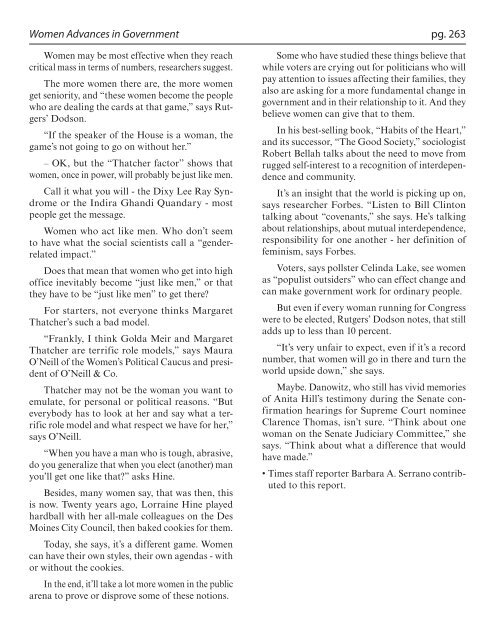Helen Sommers: An Oral History
Helen Sommers: An Oral History
Helen Sommers: An Oral History
Create successful ePaper yourself
Turn your PDF publications into a flip-book with our unique Google optimized e-Paper software.
Women Advances in Government<br />
Women may be most effective when they reach<br />
critical mass in terms of numbers, researchers suggest.<br />
The more women there are, the more women<br />
get seniority, and “these women become the people<br />
who are dealing the cards at that game,” says Rutgers’<br />
Dodson.<br />
“If the speaker of the House is a woman, the<br />
game’s not going to go on without her.”<br />
– OK, but the “Thatcher factor” shows that<br />
women, once in power, will probably be just like men.<br />
Call it what you will - the Dixy Lee Ray Syndrome<br />
or the Indira Ghandi Quandary - most<br />
people get the message.<br />
Women who act like men. Who don’t seem<br />
to have what the social scientists call a “genderrelated<br />
impact.”<br />
Does that mean that women who get into high<br />
office inevitably become “just like men,” or that<br />
they have to be “just like men” to get there?<br />
For starters, not everyone thinks Margaret<br />
Thatcher’s such a bad model.<br />
“Frankly, I think Golda Meir and Margaret<br />
Thatcher are terrific role models,” says Maura<br />
O’Neill of the Women’s Political Caucus and president<br />
of O’Neill & Co.<br />
Thatcher may not be the woman you want to<br />
emulate, for personal or political reasons. “But<br />
everybody has to look at her and say what a terrific<br />
role model and what respect we have for her,”<br />
says O’Neill.<br />
“When you have a man who is tough, abrasive,<br />
do you generalize that when you elect (another) man<br />
you’ll get one like that?” asks Hine.<br />
Besides, many women say, that was then, this<br />
is now. Twenty years ago, Lorraine Hine played<br />
hardball with her all-male colleagues on the Des<br />
Moines City Council, then baked cookies for them.<br />
Today, she says, it’s a different game. Women<br />
can have their own styles, their own agendas - with<br />
or without the cookies.<br />
In the end, it’ll take a lot more women in the public<br />
arena to prove or disprove some of these notions.<br />
pg. 263<br />
Some who have studied these things believe that<br />
while voters are crying out for politicians who will<br />
pay attention to issues affecting their families, they<br />
also are asking for a more fundamental change in<br />
government and in their relationship to it. <strong>An</strong>d they<br />
believe women can give that to them.<br />
In his best-selling book, “Habits of the Heart,”<br />
and its successor, “The Good Society,” sociologist<br />
Robert Bellah talks about the need to move from<br />
rugged self-interest to a recognition of interdependence<br />
and community.<br />
It’s an insight that the world is picking up on,<br />
says researcher Forbes. “Listen to Bill Clinton<br />
talking about “covenants,” she says. He’s talking<br />
about relationships, about mutual interdependence,<br />
responsibility for one another - her definition of<br />
feminism, says Forbes.<br />
Voters, says pollster Celinda Lake, see women<br />
as “populist outsiders” who can effect change and<br />
can make government work for ordinary people.<br />
But even if every woman running for Congress<br />
were to be elected, Rutgers’ Dodson notes, that still<br />
adds up to less than 10 percent.<br />
“It’s very unfair to expect, even if it’s a record<br />
number, that women will go in there and turn the<br />
world upside down,” she says.<br />
Maybe. Danowitz, who still has vivid memories<br />
of <strong>An</strong>ita Hill’s testimony during the Senate confirmation<br />
hearings for Supreme Court nominee<br />
Clarence Thomas, isn’t sure. “Think about one<br />
woman on the Senate Judiciary Committee,” she<br />
says. “Think about what a difference that would<br />
have made.”<br />
• Times staff reporter Barbara A. Serrano contributed<br />
to this report.
















